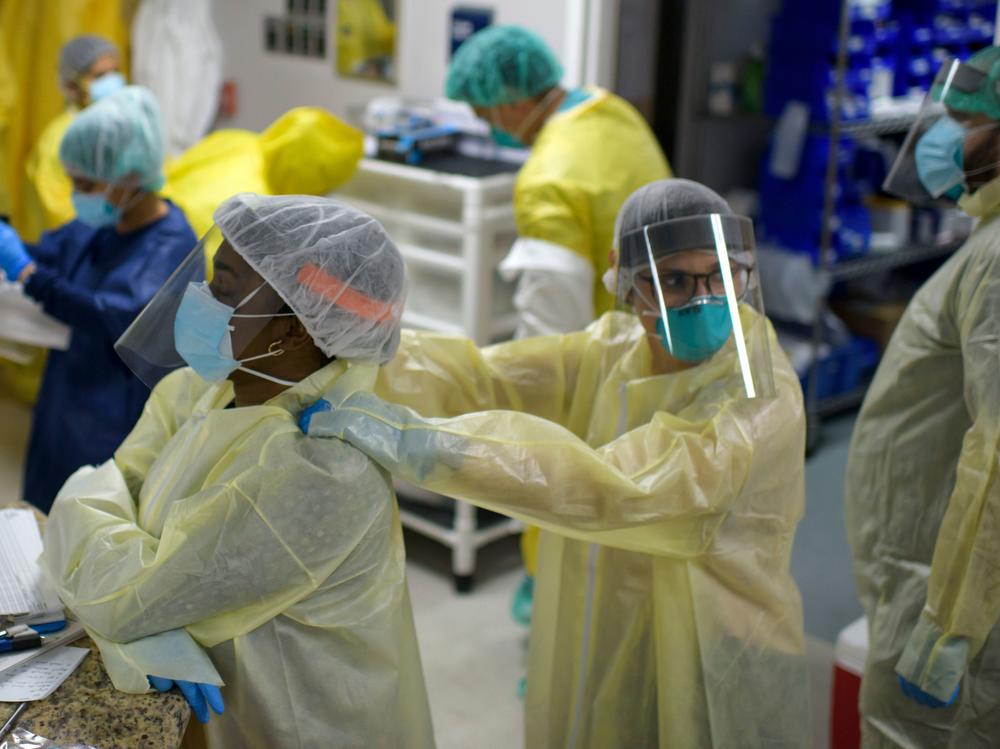Section Branding
Header Content
Texas Surpasses 1 Million Coronavirus Cases, According To Johns Hopkins University
Primary Content
If Texas was a country instead of a state, it would rank in the top 10 nations with the most overall coronavirus cases.
That's according to data from Johns Hopkins University, which also revealed that the state, the second-most populous in the U.S., surpassed 1 million cases on Tuesday.
Texas is the first U.S. state to record this number of cases. California is not far behind with 991,162 cases; Florida has 852,174. The rest of the states have each recorded under 600,000.
As of Wednesday, 6,779 patients were in Texas hospitals with the coronavirus, according to state data. More than 18,800 people in the state have died from the coronavirus.
The record number comes as the nation is battling its most widespread surge since the pandemic began. The U.S. recently recorded 10 million cases, meaning the Lone Star state accounts for about 10% of all U.S. cases.
It's also worth noting that Texas' own case dashboard has not yet exceeded 1 million. According to the Texas Department of State Health Services there have been 985,380 recorded as of Wednesday.
Mobile morgues in El Paso
El Paso County in Texas is among the hardest hit areas in the U.S.
Hospitals are overwhelmed with COVID-19 patients, and the county has summoned 10 mobile morgues to hold dead bodies, according to The Texas Tribune. The Department of Defense sent medical teams to help in early November.
The El Paso region, which is near the border between west Texas and Mexico, recorded 40% of people in hospitals were positive for the virus, the most in Texas, according to state data.
"Hospitals have been overwhelmed by sick patients pouring into ERs. And local officials there have had to bring in four mobile morgues to deal with deaths," Texas Public Republic health reporter Bonnie Petrie told NPR on Tuesday. "But it's not just an urban problem. Smaller towns and communities all across Texas are getting hit hard, too."
Texas jails
More people have contracted the coronavirus in Texas prisons than any other prison system, according to a new report from the University of Texas at Austin.
The report notes the "prison death curve in Texas has remained stubbornly high" with 231 coronavirus-related deaths occurring in prisons. Most of the people who died did not have a life sentence and were eligible for parole. About 80% who died weren't convicted of a crime.
"COVID-19 has had a devastating impact on prisons and jails across the country, and especially in Texas," said Michele Deitch, the study's lead author and criminal justice policy expert, in a statement.
The data "shows the urgency of taking steps to reduce the risks of additional COVID deaths in Texas prisons and jails."
The death count is likely higher than found in the report, researchers say. Some people in jails died without testing for the coronavirus or from a "pre-existing medical condition worsened by COVID." The report also says some could have died after being released.
"Because of high levels of 'churn' in the jail population, it is possible that individuals contracted the virus in jail, were released, and then died on the outside," the report stated. "Some jails may have intentionally released people at risk of dying so that the death would not be recorded as a jail death."
Mask wearing
On Tuesday, the Centers for Disease Control and Prevention emphasized the importance of masks in one of its strongest endorsements of their effectiveness. Wearing masks can both prevent asymptomatic carries from spreading coronavirus, but it also offers protection against the infection, the organization stressed.
Yet as Petrie of Texas Public Radio explains, there's resistance to mask wearing especially in rural areas.
"For instance, in a rural place like Kerr County, there's been a lot of pushback on mask mandates. It's often framed in these areas as an issue of freedom and liberty," she explained.
As the pandemic has stretched along, many people have experienced pandemic fatigue and relaxed precautions.
"In July, everybody's wearing masks. It was 100%. If somebody wasn't wearing a mask, you could just feel the stares at them — and you'd see people like picking up their shirts and covering their noses with it," said Galveston County health authority Dr. Philip Keiser in a late October interview, according to The Texas Tribune.
But now, some people wear masks, some pull it under their nose or chin, he said, which renders them ineffective. And occasionally, there's open defiance, he said.
"There are many instances where our personal liberties have been impugned because of greater good. Wearing a seat belt is one. Driving the speed limit is one. Placing a child in a child carrier in a vehicle," said Will Rector, a doctor in Kerr County. "Those are all things that are against our personal liberties, but we do them because we realize that they save lives.
Copyright 2020 NPR. To see more, visit https://www.npr.org.
Bottom Content

